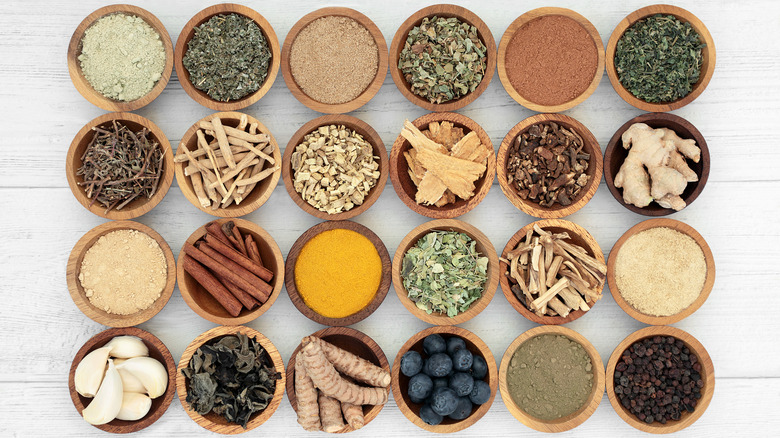The Truth About Adaptogenic Foods
The recent rise of the term "adaptogens" on menus across America might make the food group seem like the next big health fad since Gwyneth Paltrow made oil pulling and goat milk cleanses a thing. Experts across the globe, however, are asserting that this new food trend is backed by medical research and has been used since as far back as World War II (via Australian Macadamias).
Adaptogens are essentially certain herbs and mushrooms found in nature that have properties that can help human bodies cope and react better to both physical and mental stress (via Healthline). Research suggests that adaptogenic foods can also help combat physical tiredness, improve mental performance, which includes helping with depression and anxiety, build immunity, and simply help keep your well-being in check.
Some suggest that adaptogenic foods have been used medically since before the 20th century in Ayurvedic and ancient Chinese medical traditions, but researchers only started looking into their validity since the second world war. Research began when the Soviet Union went looking for a concoction of herbs to put into one tiny magical pill that would give its armies an advantage over others by improving their endurance and helping them cope with the stresses of war better. Since then, it's generally accepted that adaptogenic foods do indeed work.
Adaptogenic foods can help you adapt to stress
Per Healthline, human bodies respond to stress in three stages — alarm, resistance, and exhaustion — a response known as general adaptation syndrome or GAS. Adaptogens help you by supporting one's resistance to stress for longer periods of time and then evening out the exhaustion stage so you don't experience an extreme crash.
As magical as they may seem, adaptogens don't work like a "pill" that you can pop every now and then under a stressful situation. Chicago-based dietician Vicky Shanta told Everyday Health that adaptogenic foods need to be incorporated into diets consistently and carefully, over a long period of time to work. Healthline also notes that each adaptogen has a different health benefit, so it's important to find the cocktail that works best for your body, consume it at the right time of the day, and change the type of adaptogen you're consuming every six weeks.
While some adaptogenic foods are a tad harder to find, the ones you're likely to find easily include American ginseng, which helps with reaction to stress, immunity, and memory; turmeric, which can ease depression and boost your overall brain health; goji berries, which can help you stay calm and sleep better; and holy basic and ashwagandha, which both help with depression and anxiety. You could take your adaptogens as you would any other medicine, however, there are ways to make these foods more fun to consume every day. Healthline suggests turning the herbs into teas or sprinkling them into smoothies. Or, you could get creative and add them to soups, desserts, and jams, too.

